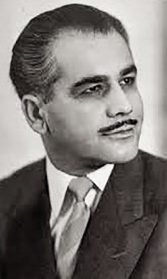Prof.Dr. Ali Rıza Özbek
Ali Rıza Özbek was born in Muğla on April 3, 1914. He began his secondary education at İzmir Erkek (Atatürk) High School. He graduated top of his class in 1933 from Kabataş High School in Istanbul, where he had been sent on a scholarship. He took and passed the examination held to select students to be sent abroad. On October 26, 1934, he went to Germany and enrolled at the University of Munich. He took mathematics courses from Friedrich Böhm, an expert in cost/insurance mathematics, and from Oskar Perron, who worked on differential equations. His synthetic geometry instructor was Friedrich Hartogs. He studied analytic geometry with the renowned mathematician Heinrich Tietze, known for the Tietze extension theorem and his significant contributions to group theory. In 1936, he left Munich and attended the University of Hamburg, where he continued in the “Mathematics-Natural Sciences” program between 1936 and 1939.
At the end of August 1939, two days after Özbek left Hamburg, the German army invaded Poland, and the Second World War began. After a while, he moved to Breslau under German occupation and graduated from the Department of Mathematics at the University of Breslau. He completed his doctoral studies at the Faculty of Natural Sciences of the Silesian Friedrich Wilhelm University in Breslau (now the University of Wroclaw). His thesis on the “Fano Axiom,” which is expressed as “The three diagonal points of a complete quadrilateral can never be collinear,” was published in 1943 under the title Das Fano’sche Axiom. Between January 1, 1942, and July 30, 1943, Özbek participated in education and scientific activities at the Chair of Advanced Mathematics at the Institute of Mathematics of the Breslau Technical School (Technische Hochschule Breslau).
Upon returning to Turkey, Özbek began working as an assistant on November 1, 1943, at the Chair of Advanced Mathematics in the Faculty of Civil Engineering of the Higher School of Engineering (renamed Istanbul Technical University in 1944). He served as senior assistant at the same chair between January 1 and July 31, 1946. In May 1946, he applied for the title of associate professor with his doctoral thesis titled Fano Aksiyomu (The Fano Axiom) and served as an associate professor between August 1 and October 11, 1946. On November 12, 1946, he transferred as an associate professor to the Chair of Advanced Mathematics of the Faculty of Mechanical Engineering, which had been established in 1944. He was among the founding members of the Turkish Mathematical Society, established in 1948.
One of the mathematicians from whom Ali Rıza Özbek took courses at the University of Hamburg was the Austrian mathematician Wilhelm Blaschke, known for his work in differential and integral geometry. After retiring from the University of Hamburg, Blaschke came to the Faculty of Science at Istanbul University several times as a visiting professor and taught differential geometry courses during the 1954–55 academic year. Özbek translated into Turkish the 9 lectures Blaschke gave at ITU in 1955, 1956, and 1957. These translations were published under the title Wilhelm Blaschke’nin Konferansları (Wilhelm Blaschke’s Lectures) by ITU in 1965.
At the ITU Senate meeting held on June 27, 1963, Özbek was promoted to the position of tenured professor at the Chair of Advanced Mathematics in the Faculty of Mechanical Engineering. Following the death of Tevfik Okyay Kabakçıoğlu, he was elected as a member of the ITU Senate and held this position until 1982. On July 8, 1973, he was appointed as professor to the Chair of Analysis and Its Applications to Geometry in the Faculty of Basic Sciences. Thus, he began teaching in the Mathematical Engineering Program. When the Faculty of Basic Sciences was transformed into the Faculty of Science and Letters in 1982, Özbek transferred to the new faculty on March 1, 1982, along with his academic post. After 42 uninterrupted years of service, he retired voluntarily from ITU on February 3, 1983.
Living in Istanbul until 2001, Özbek moved to Muğla that year. He restored his 300-year-old family home and donated it to the Muğla Municipality to be used as the “Özbekler Evi Museum.” Prof. Dr. Ali Rıza Özbek passed away at the age of 98 on June 14, 2011, at Muğla State Hospital, where he was receiving treatment, and was buried in the family cemetery in the old graveyard of the city.
*This biography was compiled by our board member Özkan Değer for the booklet “TMD 75 Yılın Ardından,” prepared on the occasion of the 75th anniversary of the Turkish Mathematical Society.
